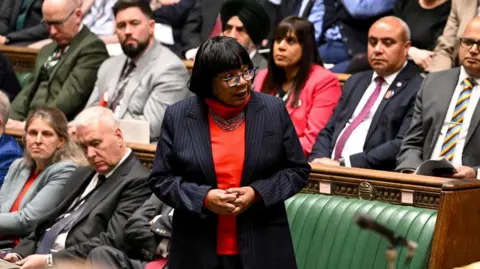In the political landscape of the United Kingdom, few stories are as complex and polarizing as that of Diane Abbott, the Labour MP who has captured the nation’s attention for decades. Abbott made history as the first black woman elected to the House of Commons and, as of today, serves as the Mother of the House, a title denoting her tenure in Parliament since her election in 1987. Yet, despite her groundbreaking role and significant contributions to British politics, Abbott has recently found herself embroiled in controversy, leading to her suspension from the Labour Party once again. This latest chapter raises questions not only about Abbott herself but also about the broader implications for the Labour Party as a whole.
The roots of the current controversy reach back to April 2023 when Abbott penned a letter to The Observer, which ignited a storm of criticism. In her letter, she made remarks that many construed as equating antisemitism with other forms of prejudice, such as the discrimination faced by people with red hair. Her original statement read: “Irish, Jewish and Traveller people undoubtedly experience prejudice. This is similar to racism. It is true that many types of white people with points of difference, such as redheads, can experience this prejudice. But they are not all their lives subject to racism.” The phrasing drew immediate backlash, resulting in her suspension from the party.
After a period as an independent MP, Abbott was reinstated just in time to run as a Labour candidate in the previous general election. However, the recent resurfacing of the controversy struck again. In a BBC Radio 4 interview recorded in May but aired weeks later, Abbott reiterated her stance, stating emphatically that she does not regret her previous comments. The lack of contrition is a significant sticking point—this refusal to retract her statements about the nature of racism and her previous comments creates a challenging narrative for both her and the Labour Party.
Sir Keir Starmer, the current leader of the Labour Party, has taken a firm stance against antisemitism, particularly in light of the party’s tumultuous history during Jeremy Corbyn’s leadership. Under Corbyn, Labour was found to have breached the Equality Act three times by the Equality and Human Rights Commission, prompting Starmer to commit to “tearing out this poison by its roots” from the party. Given this historical context, the Labour Party feels pressured to act decisively in light of any perceived antisemitic language, putting Abbott’s repeated comments in a precarious position within the party’s framework.
In response to her suspension, Abbott stated that it is “obvious this Labour leadership wants me out,” framing her remarks as sound and justifiable. She has positioned herself as a misunderstood figure, asserting the factual correctness of her previous comments, while once again finding herself in a status of suspension and re-evaluation of her political career.
The inner workings of party dynamics play a significant role here, as Abbott’s situation puts both her future and that of the Labour Party into question. With her history of service and her groundbreaking role as a politician, the party must engage in deep introspection, not only to maintain its integrity but also to balance historical recognition with contemporary accountability. As Abbott potentially faces a new chapter apart from the Labour Party, her old political ally, Jeremy Corbyn, is attempting to carve his own path with a new leftist party initiative.
In summary, the saga of Diane Abbott and her suspension from the Labour Party illustrates the complexities of political affiliations, the ramifications of language in political discourse, and the efforts by leaders to cultivate a party image that resonates with current societal values. As Abbott reassesses her future, the Labour Party also finds itself at a pivotal junction, navigating the delicate balance between its legacy and its present-day commitments.











